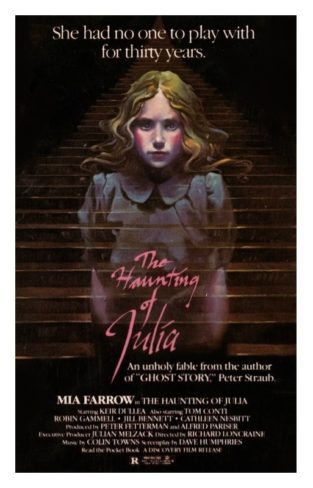 An appealingly creepy, understated and compelling film that deserves comparison with better-known 1970s chillers like LET’S SCARE JESSICA TO DEATH and DON’T LOOK NOW—and that’s high praise indeed!
An appealingly creepy, understated and compelling film that deserves comparison with better-known 1970s chillers like LET’S SCARE JESSICA TO DEATH and DON’T LOOK NOW—and that’s high praise indeed!
Peter Straub’s 1975 novel JULIA was the inspiration for this 1977 film, which was initially titled FULL CIRCLE but seems destined to be best known under its American title THE HAUNTING OF JULIA. It’s become undeservedly obscure over the years, and is long overdue for a rediscovery—preferably on DVD!
The mousy Julia is severely traumatized after giving her choking daughter Katie an emergency tracheotomy with a steak knife, which the girl doesn’t survive. Following this event Julia leaves her abusive husband and moves into a creepy old townhouse.
There she suffers visions of a still-living Katie. She’s losing her mind, it seems, and her husband is looking to have her committed.
One night Julia and some friends hold a séance in her living room, and an old woman goes into a trance. Later the woman reveals to Julia that while in the trance she contacted a girl very much like Katie. Shortly after this Julia’s hubbie breaks into her house and, hearing many odd sounds, believes Julia’s trying to scare him; she’s not home, however, and he meets his end in a suspicious accident in Julia’s basement.
Unaware of her husband’s death, Julia questions the old woman further. The latter reveals that she didn’t actually see a little girl resembling Julia’s daughter, as previously assumed, but rather a little boy.
This leads Julia on a search for the source of this vision. She uncovers info on a German immigrant boy who was tortured and killed by a gang of schoolchildren, all under the depraved influence of a psychotic little girl. It’s the latter, Julia deduces, whose spirit is actually haunting her house. Julia visits the girl’s deranged mother in a local nuthouse, and she reveals that she killed her own daughter just as Julia killed hers. From there Julia heads back to her house for a final confrontation with the many ghosts haunting her.
Richard Loncraine has directed films that are interesting (the feature version of Dennis Potter’s BRIMSTONE & TREACLE, 1995’s RICHARD III) and not-so (FIREWALL, MY ONE AND ONLY). THE HAUNTING OF JULIA represented a rare excursion in horror for Loncraine, and is unquestionably one of his strongest films.
It’s distinguished by unpretentious craftsmanship, appropriately measured pacing and a restraint that actually renders the most horrific moments (notably the early tracheotomy, which is never explicitly shown) more horrifying than they probably would have been if presented in a more graphic manner. The acting is also strong, with Mia Farrow providing a strong and sympathetic anchor (although, as she often did in her early days, she emotes in a wholly unconvincing English accent).
On the downside, the generally effective electronic score by Colin Towns has a tendency to grow distracting, and the narrative could frankly be a little stronger. JULIA is not one of Peter Straub’s better novels, being a clichéd haunted house tale in many respects, and this film follows suit. It contains an utterly superfluous love story, with Tom Conti as the thoroughly bland object of Julia’s affections (when he’s killed off near the end there’s little sense of loss), and too many scenes that directly recall those of other, lesser seventies horror fests (such as the heroine’s obligatory trip to the library to gather info on the ghosts haunting her).
Yet the tightly controlled atmosphere and ever-present sense of muted terror render this film unique and effective. It’s worth seeking out.
Vital Statistics
THE HAUNTING OF JULIA (a.k.a. FULL CIRCLE)
Canadian Film Development Corporation
Director: Richard Loncraine
Producer: Peter Fetterman, Alfred Pariser
Screenplay: Harry Bromley Davenport, Dave Humphries
(Based on a novel by Peter Straub)
Cinematography: Peter Hannan
Editing: Rom Wisman
Cast: Mia Farrow, Keir Dullea, Tom Conti, Jill Bennett, Robin Gammell, Cathleen Nesbitt, Anna Wing, Edward Hardwicke, Mary Morris, Pauline Jameson, Arthur Howard, Peter Sallis
